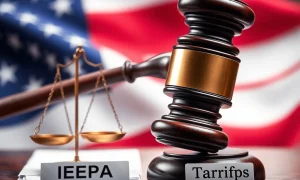A federal appeals court has delivered a stunning blow to presidential trade authority, declaring most of Donald Trump‘s global tariffs unconstitutional in a landmark decision that could reshape American trade policy for generations. This ruling challenges the very foundation of executive power in international commerce.
Court Rules Trump Tariffs Unconstitutional
The U.S. Court of Appeals for the Federal Circuit issued a decisive 7-4 ruling that Trump overstepped his authority by invoking the International Emergency Economic Powers Act to justify broad tariffs. Consequently, the court determined that IEEPA does not grant the executive branch power to impose tariffs or taxes. This finding represents a significant check on presidential authority.
Immediate Impact on Trade Relations
Despite the ruling, tariffs will remain in effect until mid-October pending potential Supreme Court appeal. However, businesses face immediate uncertainty regarding:
- Potential refunds of billions in collected import taxes
- Supply chain disruptions across multiple industries
- Negotiation complications with trading partners
- Market volatility in affected sectors
Legal Precedent and Future Implications
This decision establishes a crucial precedent limiting presidential trade powers. The ruling clarifies that tariffs represent a legislative function under the Constitution. Furthermore, it may prompt Congress to consider legislative reforms defining executive authority boundaries more precisely.
USTR Response and Ongoing Negotiations
U.S. Trade Representative Katherine Tai has reaffirmed the administration’s commitment to advancing trade negotiations despite the legal setback. Her office emphasizes continuing focus on:
- Strengthening critical supply chains
- Addressing non-tariff barriers
- Promoting equitable trade relations
- Maintaining negotiation timelines
What This Means for Global Trade
The ruling primarily affects reciprocal tariffs on imports from China, Canada, and Mexico. Importantly, steel, aluminum, and copper tariffs remain unaffected under different legal frameworks. Nevertheless, trading partners now question the stability of U.S. trade policies moving forward.
Potential Supreme Court Showdown
The administration may appeal to the Supreme Court, setting the stage for a constitutional showdown. A Supreme Court affirmation could invalidate tariffs retroactively, creating massive financial implications. Meanwhile, businesses must prepare for multiple possible outcomes.
FAQs: Trump Tariffs Unconstitutional Ruling
Q: Which specific tariffs does this ruling affect?
A: The ruling affects Trump’s “reciprocal” tariffs on imports from multiple trading partners but excludes steel, aluminum, and copper tariffs enacted under different laws.
Q: How soon could tariffs be removed?
A: Tariffs remain until mid-October 2025 during the appeal period. Removal timing depends on Supreme Court action.
Q: Will businesses receive tariff refunds?
A: If the Supreme Court affirms the ruling, billions in collected tariffs could be refunded retroactively.
Q: How does this affect current trade negotiations?
A: The ruling complicates negotiations as partners question U.S. policy stability, though officials say talks continue.
Q: Could future presidents face similar challenges?
A: Yes, this establishes precedent limiting presidential trade powers using emergency authorities.
Q: What happens if the Supreme Court doesn’t hear the case?
A: If SCOTUS declines review, the appellate ruling stands and tariffs become invalid.








